Clifford Garstang's Blog, page 134
April 22, 2011
SMALL PRESSES & LITERARY MAGAZINES CONTINUE TO INNOVATE & THRIVE By Debra Leigh Scott | New York Journal of Books
SMALL PRESSES & LITERARY MAGAZINES CONTINUE TO INNOVATE & THRIVE By Debra Leigh Scott | New York Journal of Books:

"Their offerings are not the books you find on the front tables of a Borders or Barnes & Noble. Yet these books offer some of the finest writing in the country. In fact, it has long been the case that the small press community discovers, publishes, and supports much of the finest literary talent in America. Were it not for these independent small presses, these university presses, these literary magazines, the voices of many excellent writers would never be heard."
Published on April 22, 2011 08:17
April 21, 2011
SWAG Poetry Fest Photos
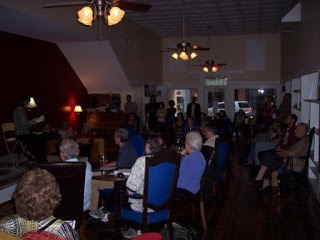 SRO crowd listens attentively to Sarah Kennedy
SRO crowd listens attentively to Sarah Kennedy Shea Anthony reads from Forgotten Theatre
Shea Anthony reads from Forgotten Theatre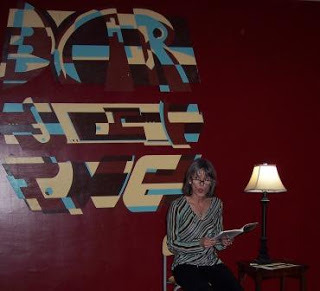 Sarah Kennedy reading from Home Remedies
Sarah Kennedy reading from Home Remedies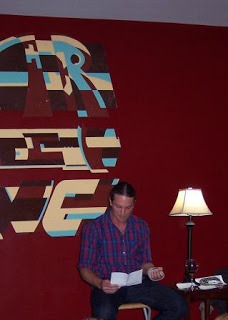 Paul Somers reading new work
Paul Somers reading new work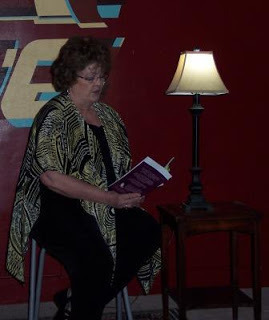 Lynn Young reading from Just a Woman
Lynn Young reading from Just a Woman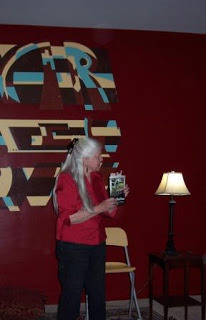 Elizabeth Solomon reading from Steering Wheel Poems
Elizabeth Solomon reading from Steering Wheel Poems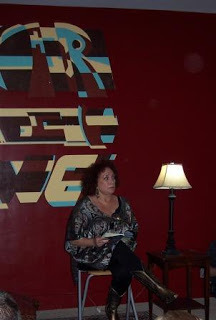 Linda Levokove reading from Walk on the Heart Side
Linda Levokove reading from Walk on the Heart Side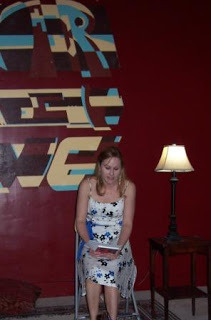 Lorraine Rees reading from Contents Under Pressure
Lorraine Rees reading from Contents Under Pressure
Published on April 21, 2011 10:25
New Postage Rates
Since most of writers these days use online submissions almost exclusively--although there are still an awful lot of places that take only snail mail subs--it may have escaped your attention that postage rates went up on 4/17.
The main changes that affect us are the increase from 28 to 29 cents for a post card, and the increased increment (from 17cents to 20cents) for every ounce over the first one for both regular envelopes and flats. (The first ounce is still 44cents and 88cents, respectively).
New Postage Rates effective April 17
New Rates compared to Old
The main changes that affect us are the increase from 28 to 29 cents for a post card, and the increased increment (from 17cents to 20cents) for every ounce over the first one for both regular envelopes and flats. (The first ounce is still 44cents and 88cents, respectively).
New Postage Rates effective April 17
New Rates compared to Old
Published on April 21, 2011 08:28
SWAG Writers' Poetry Fest
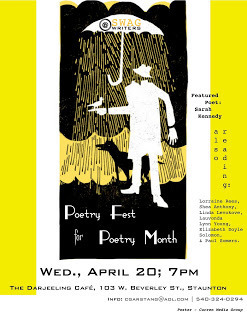
Last night, SWAG Writers—the Staunton, Waynesboro, Augusta Group of Writers—held its first (dare I say "first annual"?) Poetry Fest in honor of National Poetry Month. It was a huge success by any measure. Close to 50 people filled the Darjeeling Café, with a number of poetry lovers forced to stand or sit on the floor. (Pictures will be posted soon on the SWAG Writers Facebook Page.)
Darjeeling, which isn't technically open yet—our event was private—is a wonderful spot for readings, as several of the guests remarked. SWAG would like to thank Mary Beth Morgan for opening the Café for us and we wish her well as she makes the final steps toward her public opening.SWAG Writers was formed a year ago with a goal of raising the profile of local writers. We have hosted major readings like the Poetry Fest each quarter. We also held a panel discussion in 2010 on self-publishing, and plan to have other similar public discussions in the future. We hold a monthly happy hour on the Second Wednesdays of each month. Until this month we were doing that at the Mockingbird, but we've now added an open-mic component to the social gathering and we've shifted to Darjeeling. The next scheduled WriterDay/OpenMic is May 11, from 6-8pm.
SWAG remains informal, with no membership and no dues. We are a subgroup of the Blue Ridge Writers Chapter of the Virginia Writers Club, and we encourage our participants to join Blue Ridge Writers, but for now we plan to get by on donations to cover our minor expenses.
Our Poetry Fest was put together with the help of several people. In addition to the efforts of Mary Beth Morgan and the Darjeeling Café, we had the assistance of Lindsay Curren of the Curren Media Group who designed our poster, and Karen Lawrence of Karen Lawrence Creative Services who assisted with PR. Also, Maggie Duncan arranged for our promotional pens (they're beautiful--let me know if you want one) and handled book sales last night. Thanks everyone!
At last night's event we featured Sarah Kennedy and six other readers, and here are the bios of all the readers:
Sarah Kennedy is the author of six books of poetry, including Home Remedies, A Witch's Dictionary, Consider the Lilies, and Double Exposure . Individual poems, essays and reviews have appeared widely in literary journals, including Prairie Schooner, Shenandoah, Arts & Letters, VQR, and The Southern Review. She is the co-editor of the anthology Common Wealth: Contemporary Poets of Virginia, and she is a contributing editor for Pleiades and West Branch. Among her writing awards are The Strousse Award, the Paterson Prize, a Virginia Commission for the Arts grant, and a National Endowment for the Arts award. She is currently Associate Professor of English at Mary Baldwin College in Staunton, Virginia.
Lauvonda Lynn (Meade) Young's poems and prose have been published in numerous magazines and anthologies, including: Branches in my Hand; The Blue Ridge Anthology; The Piedmont Writer; A Poem for Your Thoughts; and in her first book of poetry, Just A Woman.
Shea Anthony has published two collections of poetry, The Forgotten Theater and Riddles of Corrosion. His work has also appeared in the anthologies The Still Horizon, Under a Quick Silver Moon and Passions of the Poet.
Elizabeth Doyle Solomon has been published widely in poetry journals, newspapers, and anthologies, including Westward Quarterly, Mid-Atlantic Poetry Review, Pegasus, Poesia, Louisiana Review, Red Owl, The Lyric, Timber Creek Review, Blue Ridge Anthology, and Nomad's Choice. Her book of illustrated nature poems, Seasons, was published by Agape Press. The Steering Wheel Poemsis Elizabeth's second book of poems.
Lorraine Rees currently resides in Charlottesville, Virginia. Her first book, Contents Under Pressure, was published in 2007. Her second book, Goodbye Zoo, is set for publication in the summer of 2011.
Paul Somers is a native of Norfolk, Virginia, but has lived in North Carolina, Arizona, and California. A photographer, he currently lives in Harrisonburg. His first collection of poems, Animal Insight, was published in 2010.
Linda Levokove's poetry has been published in the Poets of the Palm Beaches, Mid-American Poetry Review, Poetry Express, Hudson Review, The Blue Ridge Anthology, Poet's Domain, and Tonight: A World Love Anthology. Her first book of poetry, Walk on the Heart Side, was published in September 2010.
Published on April 21, 2011 06:11
The New Yorker: "The Good Samaritan" by Thomas McGuane
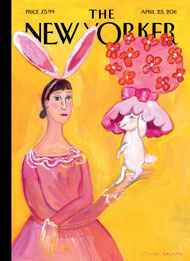
I can't say that I loved this story, but I did love some things about it.
First, it employs a classic "stranger comes to town" catalyst, and it's hard to go wrong with that. Szabo—we know everyone's first name, but not the protagonist's, which McGuane addresses in the Conversation with Deborah Treisman—is a business owner who also owns "property"—it's not a ranch, he insists. Where I live he'd be called a Gentleman Farmer, which I think is a slightly derogatory term. Early on he slips off his beloved tractor and injures his shoulder, putting him out of commission right when the hay needs to be baled. (He grows high-quality alfalfa for local horse hobbyists.) So he hires Barney, who comes with references, to help out.
Barney works wonders on the property and also spends more time with Szabo's mother than Szabo is happy about. He also criticizes Szabo's relationship with his son—who is in prison—and generally interferes such that Szabo feels the need, when his shoulder is mostly healed, to fire him. But Barney's not done causing trouble . . .
The story is behind the paywall, unfortunately, so unless you're a subscriber you won't know what happens. But not to worry, it's pretty predictable.
The second thing I loved about the story is Barney, the stranger who comes to town. He's a con man, as we guess from the beginning, but he's a straight-talker. Szabo doesn't really know what he's doing with his property, but Barney does. He tells the truth to Szabo's son, when Szabo really can't. I like him.
I also like the way all the characters are introduced. We don't meet them until the story needs them. First we get used to Szabo on the property, and it seems as though he is alone and isolated. But then he has his accident and wakes up in the hospital. At that point we learn about Melinda, his secretary (at the business we didn't know about), who is calm and efficient. Then Barney shows up. Then we learn that Szabo's mother lives an obstinately independent life nearby—first we've heard of her. Szabo is going on a trip—we don't know why—but then we learn that he has a former wife, who is remarried and living in California, and the son in prison. Some of these things are details I might have been tempted to cram into the first page, even though they weren't really needed there, and I admire McGaune's patience.
In the end, though, the sudden crisis that arises between the father and son isn't enough to rescue the story from the predictability of Barney's behavior, so ultimately the story is a disappointment for me.
April 25, 2011: "The Good Samaritan" by Thomas McGuane
Published on April 21, 2011 05:15
April 20, 2011
R.I.P. Jeanne Leiby
I didn't know Jeanne Leiby well--in fact I met her only once, at an AWP Conference--but I was very impressed with what she was doing at The Southern Review. And I was also impressed with what she had to say about her role as an editor--that was on a panel at that same conference. She seemed to me, from a distance, like a perfect literary magazine editor, and I longed to send her something that she would like. In fact, I mailed off something addressed to her this week. Her death saddens me.
Here's a tribute from someone who knew her well:
Alex V. Cook: R.I.P. Jeanne Leiby
Here's a tribute from someone who knew her well:
Alex V. Cook: R.I.P. Jeanne Leiby
Published on April 20, 2011 05:53
April 19, 2011
The New Yorker: "A Withered Branch" by Ludmilla Petrushevskaya
 I guess I'll give some allowances for this story, an appealing slice of a difficult life translated from the Russian, but if it were an American story I'd probably say that it doesn't work.
I guess I'll give some allowances for this story, an appealing slice of a difficult life translated from the Russian, but if it were an American story I'd probably say that it doesn't work. The narrator is a Russian writer in the old Soviet Union, a widow with a child in a state sanatorium with asthma. Travel is expensive, so she's hitchhiking to Lithuania—she spends a risky night with two truckers—and finally arrives in Vilnius, where she is aided by an old woman who lets her stay with her. She delivers some stories, in Russian, to the local paper, and she later receives money for their publication, translated into Lithuanian. She listens to the old woman's sad story—her family burned to death while she was at the market—but then she must leave because (and now we finally learn her destination) she must get to Thomas Mann's former home on the Baltic shore and then she must hurry back to Moscow to pick up her son. Briefly at the end of the piece she compares her own life—at least she can hold her son in her arms—to that of the old woman ("a withered branch on a dead tree").
The whole piece is contrived to have the narrator meet the old woman, who otherwise doesn't serve the plot—because there is no plot. So, as I say, it doesn't deliver what I like to see in a story, but I did find the interaction between the writer and the old woman to be charming.
April 18, 2011: "A Withered Branch" by Ludmilla Petrushevskaya
Published on April 19, 2011 10:25
Issue 7 of Prime Number Magazine is now live!
 Issue 7 of Prime Number Magazine is now live! This is our biggest issue yet, with 8 short stories, 2 essays, 3 book reviews, poems by 7 poets, and 4 interviews (although in one of those interviews the two writers--a married couple--interview each other).
Issue 7 of Prime Number Magazine is now live! This is our biggest issue yet, with 8 short stories, 2 essays, 3 book reviews, poems by 7 poets, and 4 interviews (although in one of those interviews the two writers--a married couple--interview each other).We're also excited because 2 stories from Issue 2, "Another Little Piece" by Kevin Wilson and "The Pawn" by Scott Loring Sanders, were named Notable Stories of 2010 by storySouth's Million Writers Award, and they also named Prime Number as a runner up for Best New Magazine of the year (and we only had 2 issues in 2010, so Runner up's not bad).
Published on April 19, 2011 05:30
April 18, 2011
The Pulitzer Prizes | What's New
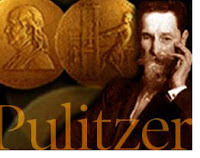 The Pulitzer Prizes | What's New
The Pulitzer Prizes | What's NewYou've probably already heard the news: Jennifer Egan won the Fiction Pulitzer for A Visit From the Goon Squad
 . I wish I could say that I've read this, although I did read the two excerpts that were in The New Yorker. I've got it, though. I'll read it soon.
. I wish I could say that I've read this, although I did read the two excerpts that were in The New Yorker. I've got it, though. I'll read it soon.It's also interesting who the two other finalists were: Jonathan Dee for The Privileges
 , and Chang-Rae Lee for The Surrendered
, and Chang-Rae Lee for The Surrendered . (I've got both of those, too. Haven't read them, either.)
. (I've got both of those, too. Haven't read them, either.)
Published on April 18, 2011 18:49
April 15, 2011
The Pale King Review - David Foster Wallace The Pale King - Esquire
 I'm prepared to accept that David Foster Wallace was a genius. I've only read short pieces by him, but I am convinced I should read Infinite Jest sooner rather than later.
I'm prepared to accept that David Foster Wallace was a genius. I've only read short pieces by him, but I am convinced I should read Infinite Jest sooner rather than later. But I don't know if I'll ever read Pale King, his posthumous novel, and one reason NOT to read it is that this review in the April issue of Esquire magazine says that I should.
I'm glad Esquire has a book review, but this one needed an editor. I don't know who Benjamin Alsup is, but surely there is an editor at the magazine who could have told him that this sentence makes no sense: "But perhaps you could care less about citizenship." What Alsup means, of course is, "But perhaps you couldn't care less about citizenship." After that, I can't take the review seriously. And since he insists I should read the Wallace book, I can't take that seriously either.
The Pale King Review - David Foster Wallace The Pale King - Esquire
Published on April 15, 2011 19:37



